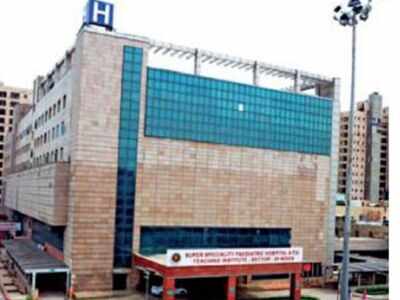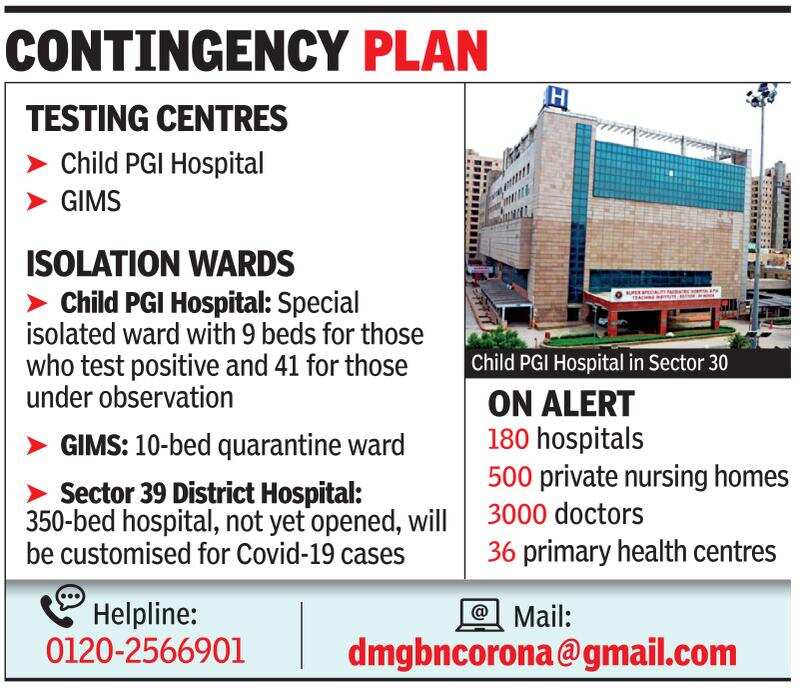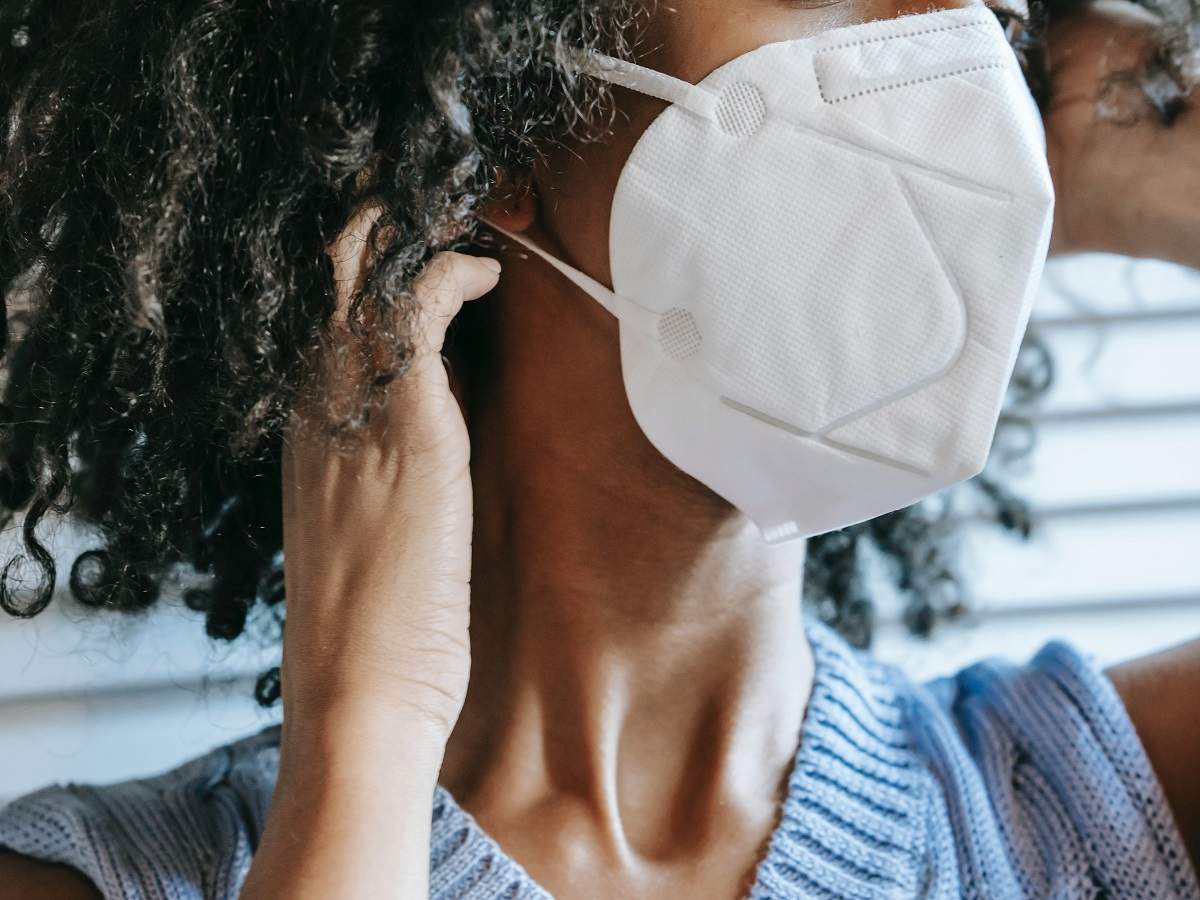
For about a year now, the promise of the district hospital in Sector 39 has remained just that. Many inaugural dates have come and gone - June 2019, November 2019, and so on. But for once, the delay may have served a purpose. New, untouched and, therefore, uncontaminated, the hospital is at the centre of the administration's contingency plan to deal with Covid-19 cases in Noida and Greater Noida.
"It's perfect for quarantine. Since it has never been occupied, there is no threat of infection. We can start medical facilities quickly and any set-up required specifically for Covid-19 cases can be put in place without moving too much around," a doctor from the health department said. The 350-bed hospital building has been ready but slow progress of administrative processes - inspection, handover - had held up its inauguration. "If the number of suspected Covid-19 cases goes up in the district, the vacant building will be our quarantine centre," Dr Anurag Bhargava, chief medical officer of Gautam Budh Nagar, said.

The old 100-bed district hospital, which was supposed to be merged with this one, will also take on Covid-19 patients should the need arise.
Of the 30 lakh people in the district, 25 lakh are in the urban areas of Noida, Greater Noida and Greater Noida West, district magistrate BN Singh said. The number of frequent international travellers and visitors is high. So is the health department prepared?
"The entire administrative machinery of the district is being utilized, as is done during elections. The health department is being supported by the revenue and development department, all district authorities and nagar palikas and panchayats," Singh said.
The plan so far has taken into account both aspects imperative to an effective response - prevention and mitigation. Private hospitals like Metro Hospital in Sector 11 and Fortis in Sector 62, for instance, have been holding awareness workshops and community drives, dispelling myths and spreading the word about basic measures that can help control the spread of the virus. About 3,000 healthcare professionals from the Metro Group of Hospitals will visit schools and RWAs to initiate conversations around hygiene and precautionary measures.
For mitigation, the health department has put 180 hospitals, more than 500 private nursing homes and medical centres, and over 3,000 doctors in the district on alert. Private hospitals have also been asked to set up isolation wards. Primary health centres - 18 additional, 15 urban and 3 block-level - and community health centres have also stepped up preparedness. Besides, the Employees' State Insurance Corporation Hospital, all three Central Government Health Scheme-empanelled hospitals and two army dispensaries in Noida have been alerted.
The Super Specialty Children's Hospital in Sector 30, also called Child PGI Hospital, has scaled up its quarantine preparedness with a 50-bed special isolated ward on the fourth floor. "We have nine beds on the isolation facility for those who test positive and 41 quarantine beds for those under observation," said Dr DK Singh, chief medical superintendent of the hospital. A team of two doctors, assistants and nursing staff will be present in every shift. "There is a backup team in case there is a rush. Doctors may also be pulled in from regular duty," he added.
At the Government Institute of Medical Sciences (GIMS) in Greater Noida, a 10-bed quarantine ward has been set up with a 10-member team on standby to deal with any Covid-19 case that comes in. The hospital is a testing centre, samples of which are being sent to the National Centre for Disease Control in Delhi. Last week, the hospital had faced a shortage of tool kits - swab buds, needles and gloves. "We needed those for sample collection to conduct coronavirus tests but had run out. The stocks were replenished in a day," said Dr RK Gupta, director of GIMS. Tests are conducted after the chief medical officer refers a case to a hospital. "While children are directed to the Child PGI Hospital, adults are being referred to here. While we started out taking just two to three samples a day, that has gone up to 12-15 samples daily now. That is why we faced a shortage," he added.
For rural areas, the health department has set aside 32 ambulances that respond to 108 and 102 on standby.
"It's perfect for quarantine. Since it has never been occupied, there is no threat of infection. We can start medical facilities quickly and any set-up required specifically for Covid-19 cases can be put in place without moving too much around," a doctor from the health department said. The 350-bed hospital building has been ready but slow progress of administrative processes - inspection, handover - had held up its inauguration. "If the number of suspected Covid-19 cases goes up in the district, the vacant building will be our quarantine centre," Dr Anurag Bhargava, chief medical officer of Gautam Budh Nagar, said.

The old 100-bed district hospital, which was supposed to be merged with this one, will also take on Covid-19 patients should the need arise.
Of the 30 lakh people in the district, 25 lakh are in the urban areas of Noida, Greater Noida and Greater Noida West, district magistrate BN Singh said. The number of frequent international travellers and visitors is high. So is the health department prepared?
"The entire administrative machinery of the district is being utilized, as is done during elections. The health department is being supported by the revenue and development department, all district authorities and nagar palikas and panchayats," Singh said.
The plan so far has taken into account both aspects imperative to an effective response - prevention and mitigation. Private hospitals like Metro Hospital in Sector 11 and Fortis in Sector 62, for instance, have been holding awareness workshops and community drives, dispelling myths and spreading the word about basic measures that can help control the spread of the virus. About 3,000 healthcare professionals from the Metro Group of Hospitals will visit schools and RWAs to initiate conversations around hygiene and precautionary measures.
For mitigation, the health department has put 180 hospitals, more than 500 private nursing homes and medical centres, and over 3,000 doctors in the district on alert. Private hospitals have also been asked to set up isolation wards. Primary health centres - 18 additional, 15 urban and 3 block-level - and community health centres have also stepped up preparedness. Besides, the Employees' State Insurance Corporation Hospital, all three Central Government Health Scheme-empanelled hospitals and two army dispensaries in Noida have been alerted.
The Super Specialty Children's Hospital in Sector 30, also called Child PGI Hospital, has scaled up its quarantine preparedness with a 50-bed special isolated ward on the fourth floor. "We have nine beds on the isolation facility for those who test positive and 41 quarantine beds for those under observation," said Dr DK Singh, chief medical superintendent of the hospital. A team of two doctors, assistants and nursing staff will be present in every shift. "There is a backup team in case there is a rush. Doctors may also be pulled in from regular duty," he added.
At the Government Institute of Medical Sciences (GIMS) in Greater Noida, a 10-bed quarantine ward has been set up with a 10-member team on standby to deal with any Covid-19 case that comes in. The hospital is a testing centre, samples of which are being sent to the National Centre for Disease Control in Delhi. Last week, the hospital had faced a shortage of tool kits - swab buds, needles and gloves. "We needed those for sample collection to conduct coronavirus tests but had run out. The stocks were replenished in a day," said Dr RK Gupta, director of GIMS. Tests are conducted after the chief medical officer refers a case to a hospital. "While children are directed to the Child PGI Hospital, adults are being referred to here. While we started out taking just two to three samples a day, that has gone up to 12-15 samples daily now. That is why we faced a shortage," he added.
For rural areas, the health department has set aside 32 ambulances that respond to 108 and 102 on standby.
Coronavirus outbreak
Trending Topics
LATEST VIDEOS
City
 Covid-19 news: UK national tests +ve; all 289 offloaded at Kochi airport
Covid-19 news: UK national tests +ve; all 289 offloaded at Kochi airport  Congress workers who put up posters shaming prominent UP BJP leaders arrested
Congress workers who put up posters shaming prominent UP BJP leaders arrested  Coronavirus: 218 Indians evacuated from Italy, land in Delhi, will be quarantined for 14 days
Coronavirus: 218 Indians evacuated from Italy, land in Delhi, will be quarantined for 14 days  Coronavirus news: Andhra local body polls postponed for six weeks
Coronavirus news: Andhra local body polls postponed for six weeks
More from TOI
Navbharat Times
Featured Today in Travel
Quick Links
Kerala Coronavirus Helpline NumberHaryana Coronavirus Helpline NumberUP Coronavirus Helpline NumberBareilly NewsBhopal NewsCoronavirus in DelhiCoronavirus in HyderabadCoronavirus in IndiaCoronavirus symptomsCoronavirusRajasthan Coronavirus Helpline NumberAditya ThackerayShiv SenaFire in MumbaiAP Coronavirus Helpline NumberArvind KejriwalJammu Kashmir Coronavirus Helpline NumberSrinagar encounter
Get the app



